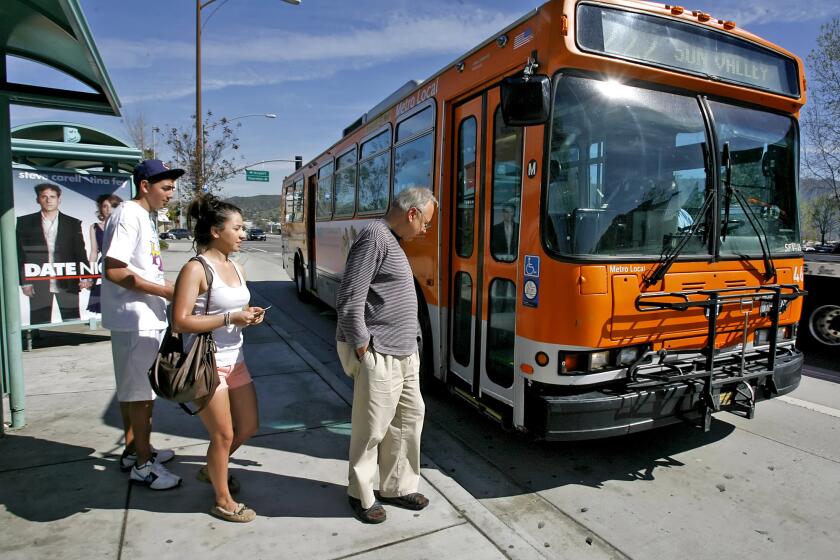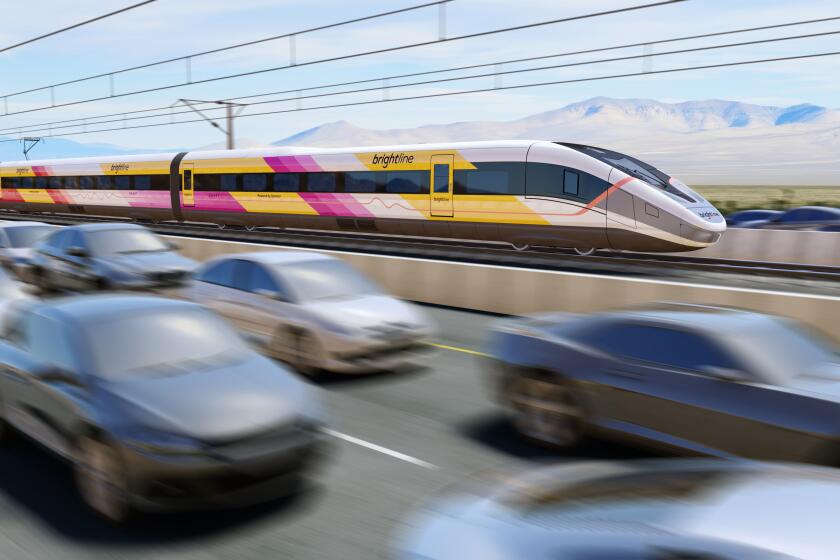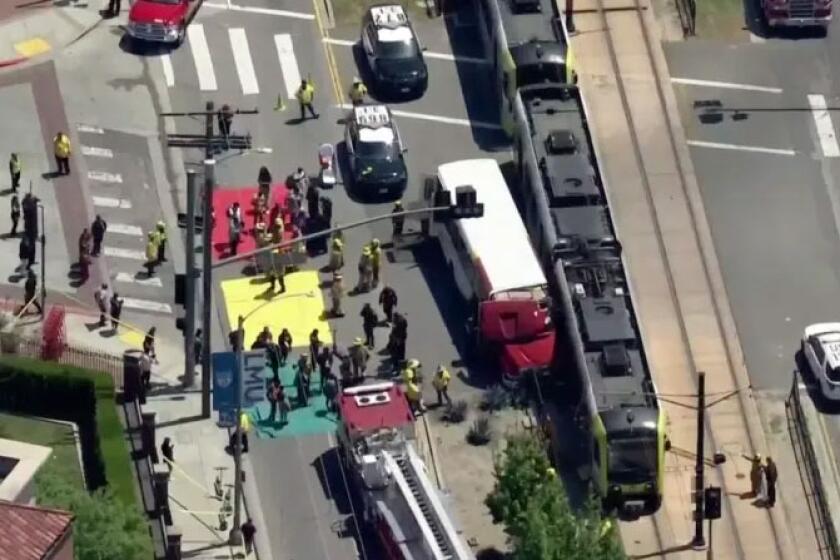House Panel Seeks Gas Tax Hike for Transit : Transportation: Committee wants increase of 5 cents a gallon. Projects would include funding to extend Metro Rail.
A landmark transportation bill approved Thursday by a House committee would raise the federal gasoline tax by a nickel a gallon and earmark more than $1.9 billion over the next five years for a smorgasbord of California highway and transit projects, including extension of Metro Rail in Los Angeles and the Bay Area Rapid Transit system.
In addition, the $153.5-billion transportation measure would send $9.8 billion to California from 1992 through 1996. These funds would be allocated by formulas for specific highways, bridges, bus systems and rail lines. The bill, which would increase the federal gasoline tax to 19 cents, was approved 49 to 7 by the House Committee on Public Works and Transportation.
Among the requests not honored by the public works panel was one pushed by the Walt Disney Co. for $395 million for transportation improvements near the Disneyland theme park in Anaheim. Rep. Norman Y. Mineta (D-San Jose), who chairs the committee’s surface transportation subcommittee, said the panel was unable to separate those parts of the plan that were of benefit solely to Disney from those that would benefit the public.
The action on the transportation bill sets the stage for a confrontation with the Bush Administration, which has vowed to veto any bill that includes a gas tax hike. The only Californian on the public works panel who voted against the measure was Rep. Christopher Cox (R-Newport Beach), who opposes the gas tax increase.
The Senate already has passed a $123-billion transportation bill, while the Administration has proposed a $105-billion program. Neither plan includes a higher gasoline tax. The tax rose from 9 cents to 14 cents a gallon last January, in part to help reduce the federal budget deficit.
The House measure would rewrite the patchwork of programs that for the last 35 years have governed the way the federal government parcels out to states billions of dollars in transportation aid. The programs have been largely unchanged since 1956, when Congress developed most of them to pay for construction of the 43,000-mile system of interstate highways, which is now almost complete.
“Our bill is a departure from the Administration and the Senate,” said Rep. Robert A. Roe (D-N.J.), chairman of the public works panel. “We are going in a different direction because we believe the resources they have proposed are woefully inadequate to meet the nation’s . . . needs.”
The House measure would set aside $121.5 billion for highway and bridge programs, compared to $100.7 billion under the Senate plan and $89 billion under the Administration’s proposal. Mass transit programs would receive $32 billion, instead of the $22 billion contemplated by the Senate and $15.2 billion by the Administration. The House and Senate bills would establish a federal-state match of 80-20 for highway and transit projects, far more than the 60-40 and 50-50 matches preferred by the White House.
Aside from the gas tax increase and matching shares, Administration officials have expressed concern about more than $6 billion in the House bill that is set aside for about 430 “projects of national significance,” which traditionally are regarded as pork barrel projects for members’ home districts. A large share of those projects, which were unveiled Thursday, are located in New Jersey, California, Arkansas and Pennsylvania, the home states of the “big four” leaders of the public works panel.
In a letter to Roe this week, Secretary of Transportation Samuel K. Skinner said: “Many of the projects that have been funded have not been of national significance; have not had rigorous evaluation; (and) have had little merit in terms of advancing new technology or concepts.”
The Senate bill does not include special projects.
Among the “projects of national significance” designated for California:
* $30 million to acquire right of way and to build a “transit parkway” for electric buses along Santa Monica Boulevard in the Los Angeles area from the San Diego to Hollywood freeways. The plan would include highway and transit improvements.
* $12.5 million to build car-pool lanes on the Long Beach Freeway.
* $96 million for four projects along the Alameda Street corridor that runs between Los Angeles and Long Beach, including widening roads and bridges and improving railroad crossings.
* $11.2 million to study the possibility of adding elevated car-pool or bus lanes, or rail lines, to the Santa Ana Freeway between downtown Los Angeles and the California 91 interchange in Orange County.
* $12.5 million for acquisition of additional right of way along the U.S. 101 corridor in Northern California.
* $10 million for preliminary work associated with earthquake protection for the Golden Gate Bridge in San Francisco.
Although the House committee refused to allocate the $395 million for the transportation improvements near Disneyland, a top Disney official said the company would continue to press for financial aid.
“We’re not going to give up hope,” said Joe Shapiro, senior vice president of the Walt Disney Co. “We’re going to study other alternatives.”
Even though Disney lost in Anaheim, it won in Long Beach, where the entertainment giant is considering construction of a waterfront theme park that would be called Port Disney.
The public works panel approved $4 million to study a connection between the proposed Disney park with the Metro Rail Blue Line terminus in Long Beach. The Blue Line is a light rail system that connects Long Beach with Los Angeles.
In addition to approving a number of so-called demonstration projects, the House bill sets aside $695 million over five years to help build the third segment of Metro Rail in Los Angeles. That segment would include a line running northwest from the Hollywood Boulevard and Vine Street station to North Hollywood; a second line running west from the Wilshire Boulevard and Western Avenue station to San Vicente Boulevard; and a third line of at least three miles running east from Union Station.
The legislation would commit $568.5 million over five years to help pay for the extension of the Bay Area Rapid Transit system south from San Francisco to San Francisco International Airport. It also would set aside $20 million to improve railroad crossings between Los Angeles and San Diego and $17 million for the North Bay Ferry Service operating out of Vallejo.
The House legislation would designate a 155,000-mile system of national highways, including the interstate system, which would receive up to $40 billion in aid over the life of the program. Under that program, the legislation designates 16 “high priority corridors” which would receive earmarked funds for road and mass transit improvements. Among them are corridors along Interstate 15 between Los Angeles and Las Vegas, and along Interstate 40 between Los Angeles and Arizona, which together would get $100 million.
Funding Plans
Here are some of the California highway and mass transit projects authorized Thursday by the House Public Works and Transportation Committee. Proposed funding covers five years.
LOCATION PROJECT Los Angeles Metro Rail extension San Francisco BART extension to airport Long Beach Terminal Island Freeway interchange Los Angeles Anaheim Street viaduct widening Compton Alameda Street widening Oceanside California 76 construction Los Angeles/San Diego Railroad crossing improvements Los Angeles I-110 downtown extension Los Angeles Santa Monica Blvd. electric bus project Long Beach Bus and car-pool lanes on I-710 Los Angeles/Orange County I-5 capacity expansion study Los Angeles Intersection improvements Carlsbad I-5 interchange improvements City of Commerce Atlantic Boulevard improvements Ontario Airport access roads Long Beach Metro Rail-Disney park study
LOCATION AMOUNT Los Angeles $695 million San Francisco $568.5 million Long Beach $24 million Los Angeles $24 million Compton $24 million Oceanside $21 million Los Angeles/San Diego $20 million Los Angeles $17 million Los Angeles $30 million Long Beach $12.5 million Los Angeles/Orange County $11.2 million Los Angeles $12 million Carlsbad $9 million City of Commerce $8 million Ontario $8 million Long Beach $4 million
More to Read
Start your day right
Sign up for Essential California for news, features and recommendations from the L.A. Times and beyond in your inbox six days a week.
You may occasionally receive promotional content from the Los Angeles Times.






